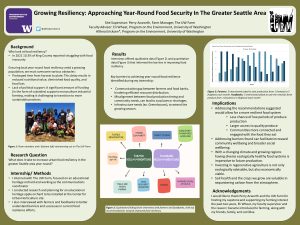Growing Resiliency: Approaching Year-Round Food Security In The Greater Seattle Area
Due to the increasing population, high cost of living, and changing food systems reviewing and improving access and quality of food, particularly fresh local produce is essential for the well-being of all communities. This aims to catalog barriers and successes of current food systems and potential transitions to a more resilient system. Methods to understand this issue included interviews with farmers and food banks in Western Washington, asking qualitative and quantitive questions to better encapsulate the many complexities. Relevant literature was also read and analyzed to help inform interviews and see academic perspectives on food system inadequacies. Lastly, a tangible aspect of my project was planning the planting of a heritage apple orchard at The UW Farm, to expand the growing season and offer a real-life example of creative solutions to food resilience, particularly in non-peak growing times of the year. Through my internship, the main barriers to achieving year-round food resilience were consistent communication between farmers and food banks, differing need times and production times, infrastructure to elongate the growing season, and labeling barriers to collaboration. These results suggest the need for greater systems in place to facilitate efficient coordination between farmers and food banks. Especially with a changing climate and changing growing regions creating flexible systems that adequately address the need for nutrient-dense food will only become more important.
